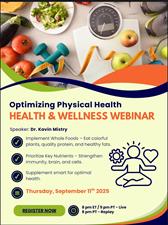
HEALTH & WELLBEING SEMINAR: Joint Health
Date and Time
Thursday Sep 11, 2025
7:00 PM - 8:00 PM CDT
September 11th, 2025 : 7pm - 8pm
Location
Zoom Registration Link:
https://us06web.zoom.us/meeting/register/zmthCyIvTtmrm52mic2rOg#/registration
Fees/Admission
Free
Contact Information
Priyanka Shivpuri
Send Email

Description
Physiology is Psychology: Building the Mind Through the Body
We live in an age where the mind has become the main stage. Productivity hacks, meditation apps, mental resilience training, and even “neuro-priming” devices promise sharper focus and greater clarity. Yet there is a quiet truth hiding in plain sight: your psychology will never rise higher than your physiology allows.
Every thought you have, every feeling you experience, every surge of clarity or crash of despair is not magic. It is chemistry. It is the neurochemical cocktail inside your brain and body, shaped by how well you slept, how you moved your body, and what you put on your plate.
Think about it: joy is dopamine, oxytocin, and serotonin dancing in balance. Anxiety is a flood of cortisol and norepinephrine untempered by GABA. Focus and flow require acetylcholine and dopamine in perfect sync. And these molecules are not summoned by willpower or positive affirmations. They are synthesized from nutrients, modulated by your gut microbiome, and fine-tuned by the signals your body receives from earth, movement, and food.
Without this foundation, psychological growth is like building a skyscraper on sand.
The Myth of Mind-First
Many people attempt to meditate, only to find themselves with a restless mind, wandering thoughts, or sheer frustration. They conclude they are “bad” meditators. The truth is simpler: meditation requires a physiological readiness.
Try to focus while running on three hours of sleep. Try to cultivate compassion while running on processed sugar and caffeine. Try to slip into flow while your mitochondria sputter from sedentary living. The mind resists not because it is weak, but because the body has not been primed.
Physiology is the prerequisite for psychology.
- Earth: Barefoot grounding lowers cortisol and shifts autonomic balance toward parasympathetic calm.
- Body: Daily movement floods your brain with brain-derived neurotrophic factor (BDNF), the fertilizer for neurons.
- Food: Nutrient-dense meals feed your microbiome, which in turn produces serotonin, dopamine, and short-chain fatty acids that calm inflammation and stabilize mood.
This is why the deepest meditation traditions were never just about sitting still. Yoga, Tai Chi, and Qi Gong were all ways to prepare the body for clarity of mind. The sages knew what modern science is now proving: the path to strong psychology runs straight through strong physiology.
The Neurochemical Orchestra
Science has caught up with what ancient wisdom whispered. The gut, once dismissed as plumbing, is now recognized as the “second brain.” Over 90 percent of serotonin is produced in the gastrointestinal tract. Dopamine precursors are shaped by microbial activity. Even GABA, the calming neurotransmitter, is partly influenced by the bacteria in your gut.
A dysregulated microbiome has been linked to depression, anxiety, and impaired cognition. In contrast, a diverse gut ecosystem correlates with resilience, adaptability, and improved mood regulation. What you eat is not just calories—it is the script your bacteria use to compose your psychological state.
Movement is equally powerful. Exercise triggers the release of endorphins, increases dopamine receptor sensitivity, and upregulates BDNF, which literally grows new neural connections. Sleep, too, is non-negotiable. Deep sleep is when the glymphatic system clears out neurotoxins and when memories consolidate. Cut sleep short and you alter emotional regulation as surely as if you spiked your brain with alcohol.
Every moment of clarity, every ounce of resilience, every spark of creativity is grounded in this orchestra of molecules. And the conductor is your physiology.
From Tricks to Transformation
Too often we reach for mental tricks to sharpen focus: caffeine jolts, motivational playlists, even sheer willpower. But deep work and flow cannot be hacked. They must be earned through the steady work of aligning physiology with psychology.
The formula is both simple and profound:
- Rest deeply: Protect sleep like it is sacred currency. It is.
- Move daily: Sweat is not punishment, it is neurochemical design.
- Eat wisely: Nourish your microbiome and you nourish your mood.
- Connect with earth: Sunlight, grounding, and fresh air are signals your biology evolved to depend upon.
When physiology is strong, meditation ceases to be a battle. Focus arises naturally. Flow becomes accessible. Clarity becomes the default, not the exception.
Strong physiology equals strong psychology. And when the two align, we discover what it truly means to live The Aligned Life—resilient, clear, and fully alive.
Going Deeper with Primal Health Design
If this resonates, you will find a fuller blueprint in my upcoming book Primal Health Design: 7 Key Paradigms to Reverse Biological Age. It outlines how to reestablish primal connections with the earth, body, food, purpose, cause, mind, and cosmos, thereby aligning physiology and psychology in harmony.
For those who want to go beyond the page, I am creating the Primal Health Design Course—a deeper dive into practices, science, and rituals that reset physiology and unlock clarity of mind. Together, the book and course provide a complete framework to design not just a longer life, but a life lived fully aligned.
References
- Ratey, J. J. (2008). Spark: The Revolutionary New Science of Exercise and the Brain. New York: Little, Brown and Company.
- Cryan, J. F., & Dinan, T. G. (2012). Mind-altering microorganisms: The impact of the gut microbiota on brain and behaviour. Nature Reviews Neuroscience, 13(10), 701-712. PubMed
- Walker, M. (2017). Why We Sleep: Unlocking the Power of Sleep and Dreams. New York: Scribner.

